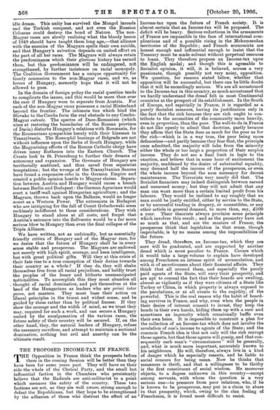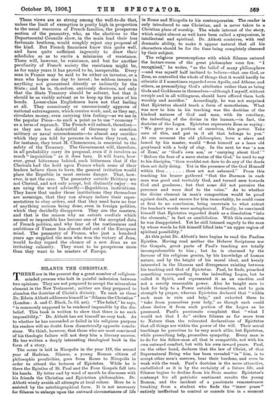THE PROPOSED INCOME - TAX IN FRANCE. T HE Opposition in France think
the prospects before them in the coming Session will be better than they have been for some years past. They will have on their side the whole of the Clerical Party, and the small but influential faction in the Chambers who persistently believe that the Radicals are anti-militarist to a point which menaces the safety of the country. These two factions are not., as they are well aware, strong enough to defeat the Republicans, but they hope to be strengthened by the adhesion of those who distrust the effect of an Income-tax tipon the future of French society. It is almost certain that an Income-tax will be proposed. The deficit will be heavy. Serious reductions in the armaments of France are impossible in the face of international com- plications and of a possible rising in the Mohammedan territories of the Republic; and French economists are honest enough and influential enough to insist that the Treasury must be made solvent without perpetual recourse to loans. They therefore propose an Income-tax upon the English model; and though this is agreeable to Socialist opinion, it will, it is believed, arouse a very passionate, though possibly not very noisy, opposition. We question, for reasons stated below, whether that opposition will be successful, but there can be little doubt that it will be exceedingly serious. We are all accustomed to the Income-tax in this country, so much accustomed that we hardly understand the dread felt in most Continental countries at the prospect of its establishment. In the South of Europe, and especially in France, it is regarded as a purely Socialist measure, having its justification only in the fact that the rich because they are rich ought to con- tribute to the necessities of the community more heavily, even in proportion, than the poor. The well-to-do in France do not like openly to admit that doctrine, partly because they affirm that the State does as much for the poor as for the rich—which is in a way true, the poor being more defenceless—and partly because they fear that, the principle once admitted, the majority will take from the minority either the whole or too large a proportion of their surplus income. They do not see a final limit in logic to the exaction, and believe that in some hour of excitement the majority, maddened by the desire of substantial equality, may demand half the income of the prosperous, or even the whole income beyond the sum necessary for decent maintenance. The Terrorists very nearly did that. The Socialist financiers may indeed distinguish between earned and unearned money ; but they will not admit that any man can want more than a certain limited profit from his labours. They would be inclined to say roughly that no man could be justly entitled, either by service to the State, or by successful trading in drapery, or comestibles, or any other article in general demand, to more than, say, .£500 a year. Their theorists always proclaim some principle which involves this result ; and as the peasantry have not so much as that, and. are the masters of France, the prosperous think that legislation in that sense, though improbable, is by no means among the impossibilities of the future.
They dread, therefore, an Income-tax, which they are sure will be graduated, and are supported by another dread which is more peculiar to France. Causes which it would take a large volume to explain have developed among Frenchmen an intense spirit of accumulation, and. with it of secretiveness about their financial affairs. They think that all around. them, and especially the poorly paid agents of the State, will envy their prosperity, and are apt to conceal the fact that their hoards are swelling, almost as vigilantly as if they were citizens of a State like Turkey or China, in which property is always exposed to the peculations, or at all events to the cupidity, of the powerful. This is the real reason why the habit of hoard- ing survives in France, and why, even when the people in their desire of interest consent to invest, they keep the bonds in their own hands, hiding them up with a care and sometimes an ingenuity which occasionally baffle even their own heirs. It is impossible to construct a plan for the collection of an Income-tax which does not involve the revelation of one's income to agents of the State; and the common French idea is that not only will the rich corrupt those agents, but that those agents will gossip, and that con- sequently each man's " circumstances " will be generally, and, what is much more important, accurately known to his neighbours. He will, therefore, always live in a kind. of danger which he especially resents, and be liable to social censure for being mean. Now he thinks that meanness is thrift, and that a willingness to be thrifty is the first constituent of social wisdom. He moreover objects, to a degree unknown in this country—except among servants, with whom the question is a very serious one—to pressure from poor relations, who, if he is known to be prosperous, may put in a claim to share in that prosperity, which, owing to the clan feeling of Frenchmen, it is found most difficult to resist. These views are so strong among the well-to-do that, unless the limit of exemption is pretty high in proportion to the usual resources of French families, the prosperous section of the peasantry, who, as the elections to the Departmental Councils show, in the main lead their less fortunate brethren, would roughly reject any proposal of the kind. But French financiers know this quite well, and have quite sufficient ingenuity to draw their schedules so as to excite a minimum of resistance. There will, however, be resistance, and but for another peculiarity of French society the resistance might be, as for many years it has proved to be, insuperable. Every man in France may be said to be either an investor, or a man who hopes one day to invest; he seldom invests in anything not guaranteed directly or indirectly by the State ; and he is, therefore, anxiously desirous, not only that the State Treasury should be solvent, but that it should be so visibly solvent as to keep up the price of his bonds. Lower-class Englishmen have not that feeling at all. They consciously or unconsciously approve of national extravagance, which creates work, and, as they say, circulates money, even carrying this feeling—as we see in the popular Press—to such a point as to use " economy " as a term of reproach. The French will submit, therefore— as they are too distrustful of Germany to sanction military or naval retrenchments—to almost any sacrifice which they are told by persons in whom they trust, as, for instance, they trust It. Clemenceau, is essential to the safety of the Treasury. The Government will, therefore, in all probability carry its proposal, even if it involves as much " inquisition " as it does hero. It will leave, how- ever, great bitterness behind, such bitterness that if the Clericals had the hold upon France which some of their leaders believe them to have, the general irritation would place the Republic in most serious danger. That, how- ever, is not the case. The peasantry outside Brittany are not Clerical, and not only accept, but distinctly enjoy.-. we are using the word advisedly—Republican institutions. They know that under those institutions they themselves are sovereign, that they can always induce their repre- sentatives to obey orders, and that they need have no fear of anything serious being done, even in foreign politics, which they decidedly disapprove. They are the masters, and that is the reason why an entente cordiale which seemed so impossible has become one of the accepted data of French politics, and why fear of the restlessness and ambitions of France has almost died out of the European mind. The peasantry of France, who just a hundred years ago supplied the men who won the victory of Jena, would to-day regard the chance of a new Jena as an irritating calamity. They want to be prosperous more than they want to be masters of Europe.















































 Previous page
Previous page